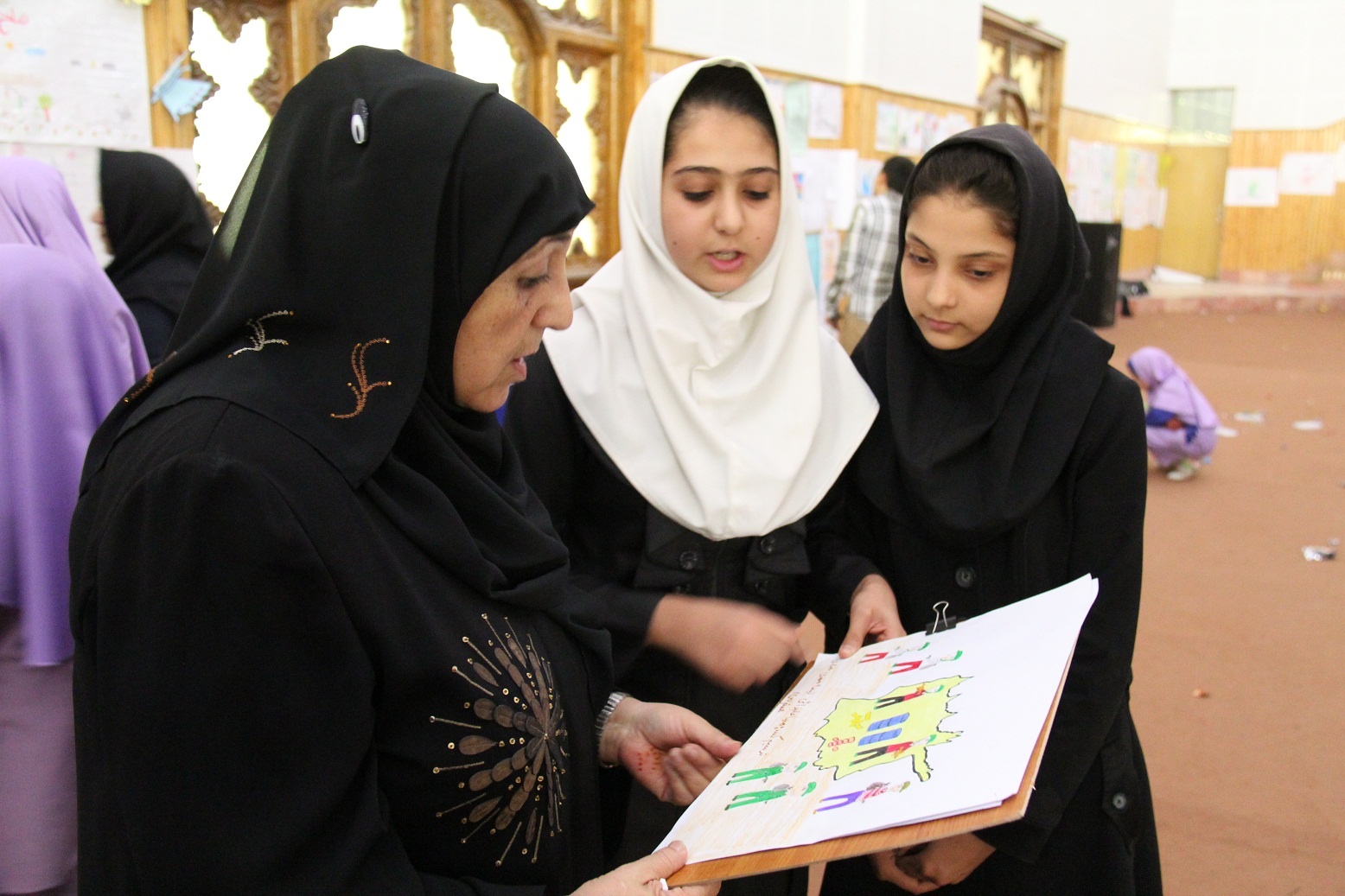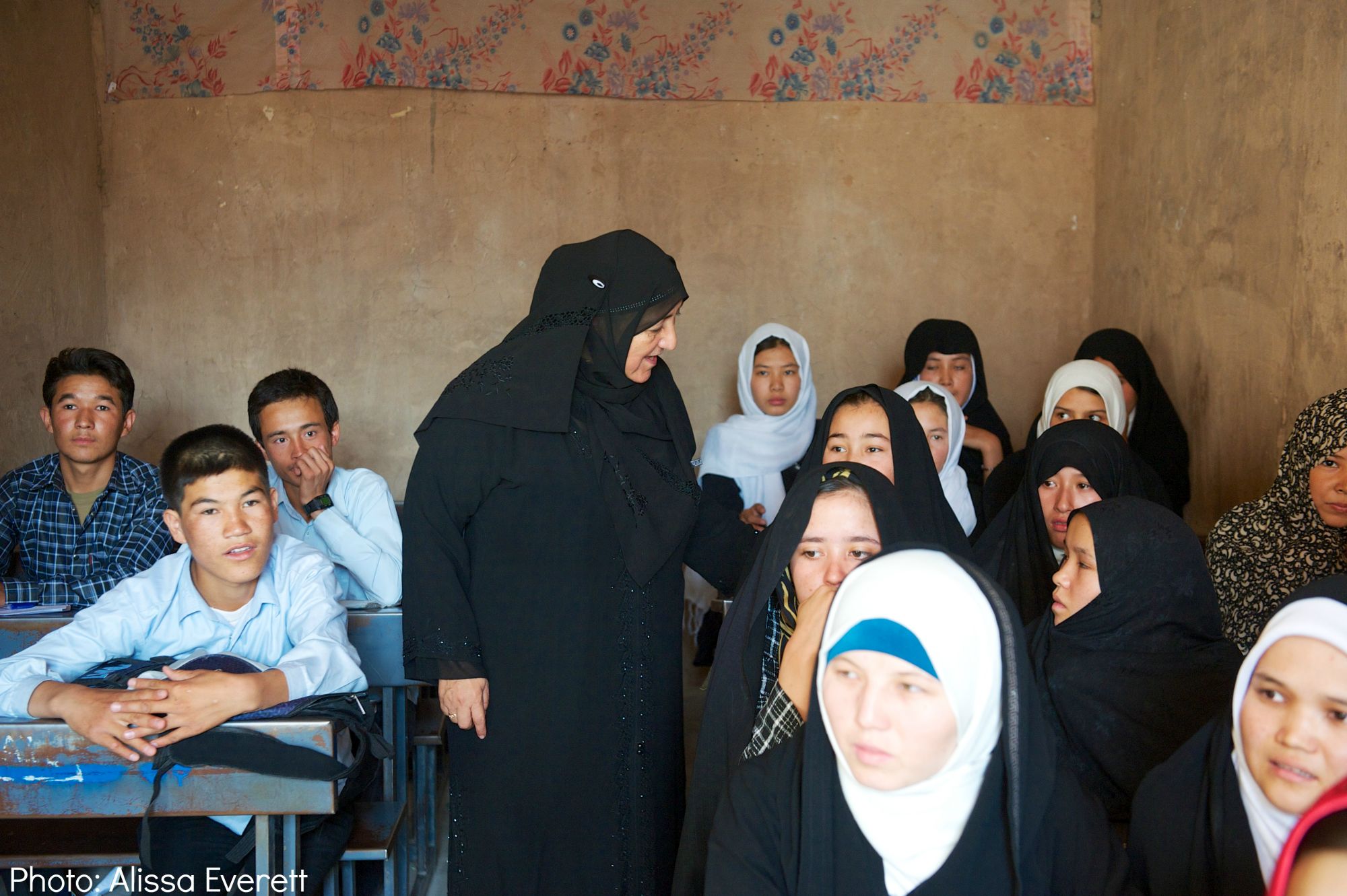During more than 20 years of war and conflict, Dr. Sakena Yacoobi has made it possible for Afghan women to receive an education.
She founded the Afghan Institute of Learning in 1995, when Afghanistan was still under Taliban rule and education for women and girls was banned. It became a pioneering center for teacher training, health education and learning for women, girls and boys across the country. Two decades on, the militant group is still active in parts of the country – but Afghan Institute of Learning has overcome all threats. It provides education in Pakistani refugee camps, and operated 80 schools in secret in Afghanistan during the 1990s. In 2001, those evolved into openly operating Learning Centers in poor rural and urban communities across Afghanistan.
Now 65 years old and a Nobel Peace Prize nominee, Dr. Yacoobi has transformed the lives of thousands of women and girls by preparing them for careers in teaching, health, leadership and more.
Women and Girls Hub spoke with her about the intersection of Islam and women’s education, and how to build community support – even from a militant regime.
Women and Girls Hub: You’ve been a leader in providing education to women and girls in Afghanistan, even in the face of threats from the country’s warring factions. How have you overcome this dangerous environment?
Dr. Sakena Yacoobi: I started my program in Peshawar, Pakistan, where there were more than 7 million refugees from Afghanistan. I established a school there. One day I was in the office, and then suddenly, I saw all of my staff running away to hide. When I asked what was going on, they said the Taliban was coming to raid the office.
As a leader, you have a responsibility to stand up for what you believe in and also protect your people. You don’t care what happens to you. So, I stayed put. And they came.
I was really scared, to tell you the truth. You don’t know what will happen. Maybe you won’t survive. But, at the same time, I believed that someone up there was protecting me.
So, I just stood up as four or five men poured into the office. They asked, “What are you doing? Don’t you know that we are not allowing girls to go to school?” I said, “I’m not doing anything.”
They replied, “What do you mean you don’t do anything, you teach.” I said, “Yeah, I teach. Please come in and have some tea.”
They refused the tea and they were shouting at me very strongly. They were big men with beards, too. I said, “Please come in and have some tea, and we’ll talk.”
They said again they didn’t want tea, and they just wanted to know what I was doing.
I said, “Well you know, I’m teaching Qur’an. Don’t you want your family to know what the Qur’an says? That’s what I am teaching, the meaning of Qur’an. And how to behave, how to be a good person, how to have values.”
One of them looked at me and said, “No, no, no, no, you are teaching something else.” I said, “Yeah, I teach health. Don’t you want your wife to be healthy? Don’t you want your children to be healthy?”
The guy was just shocked. He said, “Oh,” and he started talking to the others in Pashto. They thought I don’t know Pashto.
They said, “Let’s go, she is okay, let’s go.” When they said, “Let’s go,” I said “No, please come and have some tea with me. Let’s talk about what I am doing.” They walked into the office and took a sip of tea, and then they left.
[After that], I constantly had meetings with my staff and told them you have to show, as a role model, who you are and what you believe: you are Muslims, and you can present the true Islam so that they will be ashamed they’re saying all these things in the name of Islam.
Women and Girls Hub: What is the relationship between Islam and girls’ education in Afghanistan?
Yacoobi: In Afghanistan, people incorrectly thought Islam says not to send girls to school. But that is nonsense. Islam is a beautiful religion. The word meaning Islam means submission and peace. I tell you that there is not one single place in the Qur’an that says we should not be educated.
As a matter of fact, there are direct quotations from the Qur’an where it says man and woman should learn equally. And they should not stop learning until they die. And so if we really are Muslim, and if we really practice Islam, we should follow that.
We take those quotations from the Qur’an and teach those in our women’s rights workshops, so people can understand, interpret and analyze for themselves.
People are wrongly using religion as a power tool, and they want to use it for their own purposes. But Islam never stops women from learning.

Women and Girls Hub: Why did you decide to educate the women and girls of Afghanistan?
Yacoobi: During more than 30 years of war, Afghanistan has been completely devastated – and so far no tanks, no guns could bring us peace. I really believe that education is the vehicle that could bring us peace.
Those who suffered the most were women and children. As an Afghan woman who had the advantage of an education, I feel it is my responsibility to change their lives.
When we educate girls, I believe it will change the entire nation. When they are educated, they stand up for their rights. They will not be abused. They will not be ignorant.
Women are the ones who are really in poverty, because they don’t have equal rights as men, including economically: for example, a woman can work and then go home and the husband takes away the salary. When we invest in women, we invest in the economy of a nation.
Women and Girls Hub: How have you maintained safety for students and teachers?
Yacoobi: When you have the support of the community behind you, you don’t have to worry about it. I told each community that I would employ teachers from their own people, and they, in turn, protected my school. That relationship, that trust, really helps our program. We are not going anywhere that we are not invited. We are not going anywhere that we are not wanted. And we are not going anywhere we do not have the community behind us.
That is the success of the program. I think that in every nation, if you really want to be successful, you must work with the help of the community, and you will begin accomplishing things.
Women and Girls Hub: How has your work strengthened Afghanistan? What kind of changes have you seen?
Yacoobi: Now that women have opportunities, we can see they are so strong. They are doing business, they are traveling from country to country, and they have become so powerful. They are really blossoming, so I am proud of them.
People ask me, “Aren’t you pessimistic about Afghanistan? Why you are so hopeful?” I really think that Afghanistan has a beautiful future because, through 25 years of my work, I have seen hundreds, thousands of women, have been transformed, become self-confident, become self-sufficient, become such powerful leaders, doctors and lawyers. I’m not saying that we’ve accomplished everything. We still have a long way to go. We still have thousands of villages where there is no school, no clinic. But the areas that we could go, we do. We have a law clinic to defend women. We have a radio station, and though it’s only seven months old, it has reached 1 million people. We lost three decades; three generations were completely demolished. We lost our educated people. So, we are starting from scratch. And I hope that the world sees that and will not forget about the women of Afghanistan.

Women and Girls Hub: Can you tell the story of one of the many women you helped?
Yacoobi: One Afghan refugee woman came to my door when I was in Peshawar, Pakistan. She had lost her husband and had three children with her. She banged on the door and asked, “Give me something.” I told her we do not give handouts, but if you want to come here to learn something, we can do that. And you know what? She cried and said, “No, I can’t. I don’t know how to read and write. The only way I can survive is to go on this street and beg from people.” I told her I would help her if she brought her children here to go to school, and I would give her a job. She brought them, and I put her baby boy in pre-school and her seven-year-old daughter in a school. Her daughter blossomed. She was so smart, she learned so fast. She finished 12th grade. She went to a nursing program and became a midwife. Now, [that woman’s daughter] is working in one of our best clinics in Kabul and she is seeing thousands of women [patients]. She supports her mother and her brothers: she put them through school and [has] got a home in Kabul. She is an excellent health educator. She teaches nutrition, she is taking care of women, and doing prenatal and postnatal checks. She is like a doctor in the clinic.
Women and Girls Hub: This is a great example of how education can change one life and, in turn, impact many lives.
Yacoobi: Absolutely. I am sold on this. Over the years, I have seen woman after woman take the initiative and go through the educational system, and they changed their entire family. Now, some of those women who have been in my program are the heads of their households. That’s because the husband does not have a job – the woman has a job and she brings money home. These educated women have self-confidence, and they are in control. But it’s not good enough just to finish 12th grade; I think that for empowering women, to be a leader, to be in the political arena, we need to go beyond the 12th grade: we need to gain higher education for women.
